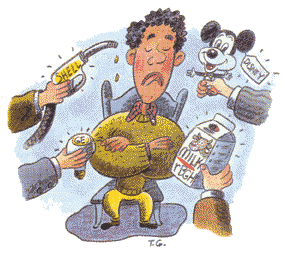Pocketbook Power
How Well-Organized Boycotts Change Corporate Policy
After biking home from work, eating an organic salad for dinner, and sending off your annual dues to Greenpeace, you decide to kick back with an ice-cold Kirin Beer—not realizing you’re supporting Mitsubishi, destroyer of rainforests. You can’t have a Coke, either, because the company sponsors an aquarium that holds rare dolphins captive. Eating a peanut butter sandwich made with JIF will run you afoul of the Procter and Gamble animal-testing boycott. Welcome to the world of consumer boycotts.

While product sensitivity is easy pickings for David Letterman’s parodies of political correctness, the truth is, once you know about a boycott, it is pretty simple to follow. And the good news is that when boycotts are well organized, they can really work. After all, they hit a corporation where it matters most: its pocketbook.
Economic boycotts have a long and illustrious history, tracing their lineage from the Stamp Act of 1765 (American colonists refused to pay a British tax) to Martin Luther King, Jr.‘s call to black and white Americans alike to stay off Alabama buses. More recently, the grassroots nonprofit INFACT arguably got General Electric out of the nuclear weapons business and Earth Island Institute’s dolphin-safe campaign brought significant change to the tuna industry.
An Effective Tactic
A nationwide survey of business executives indicated that they consider boycotts more effective than class-action suits, lobbying and stand-alone letter-writing campaigns. Companies hate the loss of sales and negative publicity these campaigns bring—an image problem that, like the much-publicized Nestl? infant formula boycott of the 1970s, can dog them for decades, even after they’ve reformed. They also know that the consumers who are most likely to heed a boycott—namely, the college-educated, thirty-to-fiftysomething, double-income family crowd—are exactly those they want to win over.
The downside to the success of boycotts is there are now so many out there, it’s often hard to remember who’s to be avoided and why. Levi Strauss, for example, which is generally considered one of the hipper and more benevolent bastions of capitalism, is being boycotted by a union group for the company’s refusal to give full compensation to San Antonio, Texas workers when they moved a factory to Costa Rica.
Like anything else, one has to pick and choose your fights. Better to follow a few boycotts well (by encouraging friends, writing letters and posting notices) than to vaguely keep up with a bunch of them. It can take years before a boycott has an effect. Most companies won’t even realize there’s a boycott against them unless it is a well organized and publicized action.
It’s crucial to accompany any refusal to buy a product with a letter to the company explaining why. As Rob Callahan, organizer of The Boycott Board (a website which indexes, summarizes and gives links to progressive boycotts) points out, “Chances are, Disney isn’t likely to notice your $7 missing from the millions it rakes in at the box office.”
The most effective boycotts typically have one or more organizations promoting them. That multiplies the loss of $7 ticket sales thousand- or million-fold. INFACT’s boycott against GE accounted for approximately $60 million in lost revenue—an attention-getting number, even for a multi-billion dollar corporate behemoth.
So what are the major environmentally-inspired boycotts going on right now? Elizabeth Elliott McGevern, managing director at Co-op America, which regularly publishes a section called “Boycott Action News” in its newsletter, emphasizes “the importance of individual inspiration in deciding what are the most crucial issues.” When pressed, McGevern lists actions against Monsanto for its Bovine Growth Hormone (rBGH), the long-term boycott against California table grapes for pesticide use, and Rainforest Action Network’s (RAN) work against companies destroying the rainforest.
RAN’s communications director, Mark Westlund, singles out Shell Oil, for destruction of habitat and political repression in Nigeria and Peru, and Texaco Oil, for wreaking havoc in Ecuador, as its most important boycotts. RAN’s long-term boycott of Mitsubishi Corporation continues in force, but Mitsubishi Motors and Mitsubishi Electric have just agreed to a company- (but not conglomerate-) wide environmental makeover—including shifting to using only tree-free paper. It’s further evidence that boycotts do work.
To keep up on the latest boycott news, Co-op America Quarterly ($20 per year) features the “Boycott Action News” as a convenient, pull-out section. “Boycott Action News” was produced in conjunction with the detailed and lively Boycott Quarterly, which recently published its final issue (due to publisher exhaustion). If you’re up for organizing your own boycott, send for Co-op America’s Boycott Organizer’s Guide ($2), which tells you how to do it right.
MARSHALL GLICKMAN is the publisher and editor of Green Living in South Newfane, VT.

